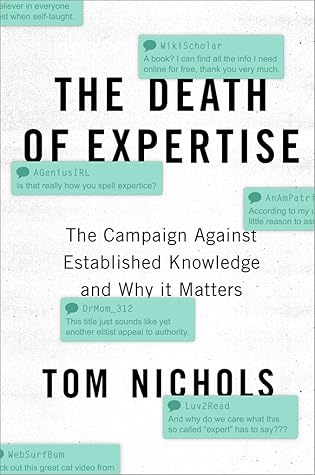More on this book
Community
Kindle Notes & Highlights
Read between
January 18 - March 14, 2022
“law of parsimony,” meaning that the most likely explanation is the one that requires the fewest number of logical leaps or shaky assumptions.
conspiracy theories are deeply attractive to people who have a hard time making sense of a complicated world and who have no patience for less dramatic explanations. Such theories also appeal to a strong streak of narcissism: there are people who would choose to believe in complicated nonsense rather than accept that their own circumstances are incomprehensible, the result of issues beyond their intellectual capacity to understand, or even their own fault.
Students have obligations to teachers. I know this sounds like strange doctrine, but let it stand. The first obligation, particularly operative during the first weeks of a new semester, is a moderately good will toward the teacher, a trust, a confidence that is willing to admit to oneself that the teacher has probably been through the matter, and, unlike the student, knows where it all leads. I do not want here to neglect the dangers of the ideological professor, of course, the one who imposes his mind on what is. But to be a student requires a certain modicum of humility. Thus, the student
...more
the social psychologist David Dunning has noted, “The way we traditionally conceive of ignorance—as an absence of knowledge—leads us to think of education as its natural antidote. But education, even when done skillfully, can produce illusory confidence.”
The Internet is a vessel, not a referee.
people misunderstand about Wikipedia and other online resources, and about the wisdom of crowds in general, is that knowledge is about a lot more than assembling a box of factoids or making coin-toss predictions. Facts do not speak for themselves. Sources like Wikipedia are valuable for basic data as a kind of perpetually updating almanac, but they’re not much help on more complex matters.
Laypeople must take more responsibility for their own knowledge, or lack of it: it is no excuse to claim that the world is too complicated and there are too many sources of information, and then to lament that policy is in the hands of faceless experts who disdain the public’s views. The public also needs to approach expert advice with a certain combination of skepticism and humility.
Meanwhile, Americans have increasingly unrealistic expectations of what their political and economic system can provide. This sense of entitlement is one reason they are continually angry at “experts” and especially at “elitists,” a word that in modern American usage can mean almost anyone with any education who refuses to coddle the public’s mistaken beliefs. When told that ending poverty or preventing terrorism is a lot harder than it looks, Americans roll their eyes. Unable to comprehend all of the complexity around them, they choose instead to comprehend almost none of it and then sullenly
...more


